
Charles Hardin Holley, known as Buddy Holly, was an American singer and songwriter who was a central and pioneering figure of mid-1950s rock and roll. He was born to a musical family in Lubbock, Texas, during the Great Depression, and learned to play guitar and sing alongside his siblings. Holly's style was influenced by gospel music, country music, and rhythm and blues acts, which he performed in Lubbock with his friends from high school.
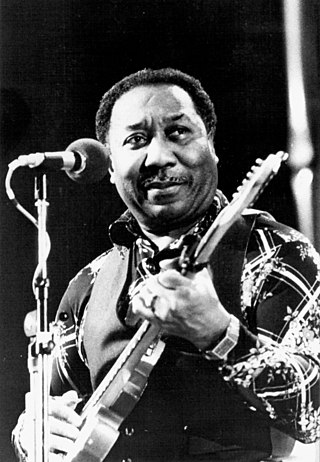
McKinley Morganfield, known professionally as Muddy Waters, was an American blues singer and musician who was an important figure in the post-World War II blues scene, and is often cited as the "father of modern Chicago blues". His style of playing has been described as "raining down Delta beatitude".

Maxwell Lemuel Roach was an American jazz drummer and composer. A pioneer of bebop, he worked in many other styles of music, and is generally considered one of the most important drummers in history. He worked with many famous jazz musicians, including Clifford Brown, Coleman Hawkins, Dizzy Gillespie, Charlie Parker, Miles Davis, Duke Ellington, Thelonious Monk, Abbey Lincoln, Dinah Washington, Charles Mingus, Billy Eckstine, Stan Getz, Sonny Rollins, Eric Dolphy, and Booker Little. He also played with his daughter Maxine Roach, Grammy nominated Violist. He was inducted into the DownBeat Hall of Fame in 1980 and the Modern Drummer Hall of Fame in 1992.
Freddie Keppard was an American jazz cornetist who once held the title of "King" in the New Orleans jazz scene. This title was previously held by Buddy Bolden and succeeded by Joe Oliver.
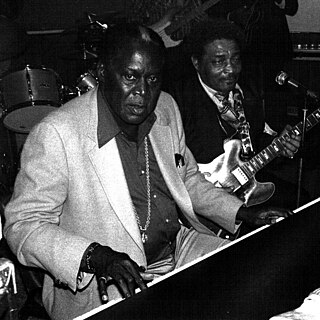
John Len Chatman, known professionally as Memphis Slim, was an American blues pianist, singer, and composer. He led a series of bands that, reflecting the popular appeal of jump blues, included saxophones, bass, drums, and piano. A song he first cut in 1947, "Every Day I Have the Blues", has become a blues standard, recorded by many other artists. He made over 500 recordings.

Benjamin Francis Webster was an American jazz tenor saxophonist.
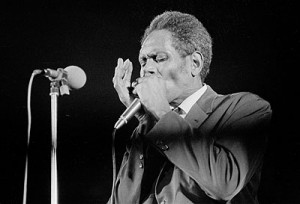
Walter Horton (April 6, 1921 – December 8, 1981), known as Big Walter (Horton) or Walter 'Shakey' Horton, was an American blues harmonica player. A quiet, unassuming, shy man, he is remembered as one of the premier harmonica players in the history of blues. Willie Dixon once called Horton 'the best harmonica player I ever heard'.

The Ozark Mountain Daredevils are an American rock band formed in 1972 in Springfield, Missouri. They are most widely known for their singles "If You Wanna Get to Heaven" in 1974 and "Jackie Blue" in 1975.

Matthew Tyler Murphy, known as Matt "Guitar" Murphy, was an American blues guitarist. He was associated with Memphis Slim, The Blues Brothers and Howlin' Wolf.

George Allen "Buddy" Miles Jr. was an American composer, drummer, guitarist, vocalist and producer. He was a founding member of the Electric Flag (1967), a member of Jimi Hendrix's Band of Gypsys (1969–1970), founder and leader of the Buddy Miles Express and later, the Buddy Miles Band. Miles also played and recorded with Carlos Santana and others. Additionally, he sang lead vocals on the critically and commercially acclaimed California Raisins claymation TV commercials and recorded two California Raisins R&B albums.
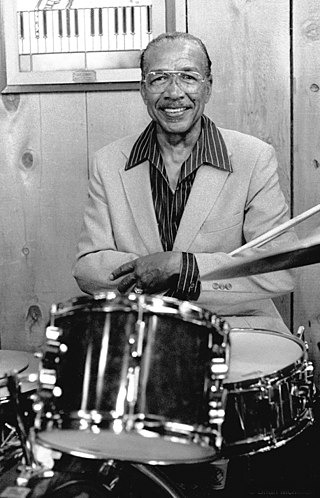
Gus Johnson was an American swing drummer in various jazz bands, born in Tyler, Texas, United States. After learning to play drums from his next-door neighbor, Johnson occasionally played professionally at the age of ten in the Lincoln Theater, and performed in various local groups, most notable McDavid's Blue Rhythm Band. Upon graduating from Booker T. Washington High School, Johnson moved to Kansas City, where he took up drumming full-time. He joined Jay McShann's Orchestra in 1938, with his music career being interrupted by his conscription into the military in 1943.
Jazz guitarists are guitarists who play jazz using an approach to chords, melodies, and improvised solo lines which is called jazz guitar playing. The guitar has fulfilled the roles of accompanist and soloist in small and large ensembles and also as an unaccompanied solo instrument.

"Too Much Blood" is a song by the Rolling Stones featured on their 1983 album Undercover, released as the album's third single in December 1984.
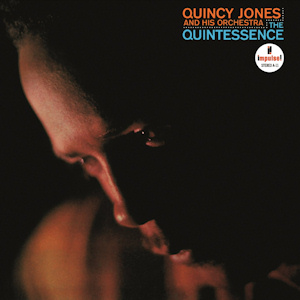
The Quintessence is an album by Quincy Jones and his orchestra. It was released in 1962 and was his only album for Impulse! One critic called it "the sound of the modern, progressive big band at its pinnacle."
The New York Contemporary Five was an avant-garde jazz ensemble active from the summer of 1963 to the spring of 1964. It has been described as "a particularly noteworthy group during its year of existence -- a pioneering avant-garde combo" and "a group which, despite its... short lease on life, has considerable historical significance." Author Bill Shoemaker wrote that the NYCF was "one of the more consequential ensembles of the early 1960s." John Garratt described them as "a meteor that streaked by too fast."
Charles Lacy Tyler was an American jazz saxophonist. He focused on baritone & alto saxophone and also played clarinet.
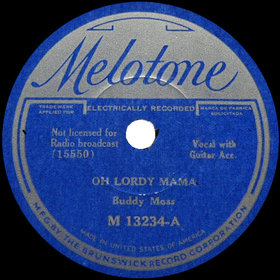
"Hey Lawdy Mama" is a Piedmont blues song recorded by Buddy Moss in 1934. The song became popular among jazz musicians with early recordings by Count Basie and Louis Armstrong. In 1943, a version recorded by Andy Kirk and His Twelve Clouds of Joy, with vocals by June Richmond, was a hit, reaching number four on the Billboard R&B chart.
"Early in the Morning" is a blues song that was recorded by Sonny Boy Williamson I in 1937. Identified as one of his most successful and influential tunes, it was inspired by earlier blues songs. "Early in the Morning" has been recorded by various musicians, including Junior Wells, who made it part of his repertoire.
Oscar "Buddy" Woods was an American Texas blues guitarist, singer and songwriter.
While the French horn is primarily used in classical music pieces, in the mid-20th century it broke into the jazz world. While the instrument remains relatively rare, the role of the French horn in jazz has developed from its beginnings in the 1940s through to the 2010s. Note that the expression "horns" in jazz is often used colloquially to refer to all wind instruments used in jazz












